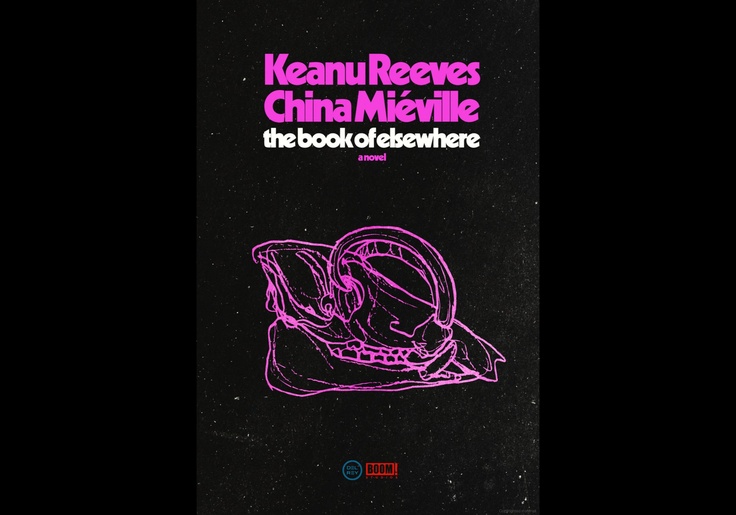Immortal Combat

Your reaction to the following lines in The Book of Elsewhere—which is about an unkillable warrior working with the American military-industrial-scientific complex in an attempt to discover whether he can die or at least achieve mortality—will be a decent gauge for how much of the book you can accept.
And what you see in the pig’s eyes you have never seen there before. Disdain.
It turns and walks away.
Pig, you say. Hey pig.
The pig is being addressed “Hey pig,” by Unute, a.k.a. B (as he is known by his American military handlers), the aforementioned immortal warrior. Turns out the pig is immortal as well, and over the millennia—nearly 80,000 years of human existence, in various forms and stages—the pig has tried to kill Unute over and over. The pig and the man exist in tandem, drawn to each other, two of a kind but not quite unique. The Book of Elsewhere traces their relationship, such as it is, at least in the sense that their two endless lives are the only constants over the dozens of millennia through which they exist.
The Book of Elsewhere is adapted from, or possibly a companion to, the comic book Brzrkr. It was written by Keanu Reeves and Matt Kindt and drawn by Ron Garney, and it is what you’d imagine a comic book version of a story about a deathless, ageless warrior now working for the U.S. military might look like: lots of big, splashy images of bloody violence, some set now, some set in the village of Unute’s youth, drawn in a blocky, chaotic style suggesting kinetic action. I don’t think it quite works as anything other than a storyboard for a potential cinematic adaptation by Reeves since the character of Unute—with his world-weariness and shoulder-length black hair—is clearly modeled on the actor. I didn’t make it past the first four issues.
The novel, however, has a surprising depth of feeling to it. Reeves’s coauthor on the book, China Miéville, hops through the centuries with ease and brings us inside the head of Unute while largely eschewing the action and the violence that takes up so much space in your average issue of a superhero comic. The book opens with a shocking act of self-destruction, as one of Unute’s fellow warriors detonates a suicide bomb in his presence filled with charms—crucifixes, garlic, that sort of thing—in the hopes of ending his permalife. It doesn’t work, obviously, but you come to understand why this former colleague would do what he does: When Unute goes into battle, he enters a sort of lightning-eyed fugue state, killing anyone and anything in his path, friend or foe alike. This has led, with some jarring regularity, to his fellow soldiers falling victim to Unute’s “friendly fire.”
A preoccupation with death hangs over the book: the death Unute delivers, of course, but also Unute’s own inability to die, his own inability to understand what his life means if it cannot end. When badly enough injured, his body shuts down and regenerates from a fleshy egg, but these petites mortes are little more than a pitstop for him. He doesn’t want to die, precisely, just to know that he can. For something new, after all these centuries of sameness: “Death not as destination but as horizon. Not death up close. His desire not for the end but to continue not-ending in a quite new way. In the shadow of life’s culminating end.”
Reading The Book of Elsewhere, I could see why British sci-fi/fantasy novelist Miéville has won a pair of Arthur C. Clarke awards; his short story collection, Looking for Jake, demonstrates why he was the perfect fit for this eons-spanning novel. In that collection, Miéville hops through eras and through genres, generally landing on a protagonist who isn’t entirely sure how he found himself in a situation or where his friends have got off to. There’s a sense of mystery running throughout stories like “Looking for Jake” (in which London has been infested by some sort of vampiric foe and whole sections of the city are disappearing) or “Different Skies” (in which a pensioner installs a vintage pane of glass that provides a glimpse into some other, terrifying place and time). Running throughout is the theme of a civilization that’s gone off course and, somehow, has become unmoored.
There’s a similar sense of mystery here, as Reeves and Miéville aren’t really aiming to answer questions so much as ponder obscurities. The Book of Elsewhere alternates between the present—in which Unute attempts to understand what is hunting him and his pig friend and why—and flashes to his past. He travels through worlds of Conan-like barbarity, takes passage on ships that call to mind Bram Stoker’s Demeter, sits down for a chat with a man we are led to believe is Sigmund Freud, and dies continuous centuries of torturous little deaths at the hands of a fellow god-like being. Through it all, it feels as though Unute is searching for death less than something new, something different, something surprising.
It’s almost impossible to read the book without imagining Reeves in the title role, which in turn helps render a bit more believable the number of tired-sounding “fucks” this immortal creature utters. A sort of existential weariness has long been a key tool in Reeves’s box, from Neo in The Matrix to John Wick back to his work as Buddha for Bernardo Bertolucci. One can imagine him sliding perfectly into the role of Unute, who kills not quite out of boredom but not far off either. It’s something to do, at least.
The Book of Elsewhere is a little odd and occasionally frustrating, particularly if you’re the sort of person who needs clear answers to the mysteries presented by worlds of literary fantasy. But I found it captivating and can imagine it serving as a fine vehicle for Reeves’s talents.
The Book of Elsewhere: A Novel
by Keanu Reeves and China Miéville
Del Ray, 352 pp., $30
Sonny Bunch is culture editor of the Bulwark, where he hosts the podcasts Across the Movie Aisle and The Bulwark Goes to Hollywood.




